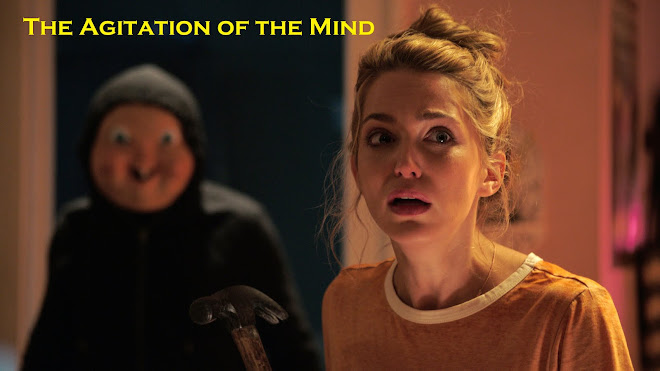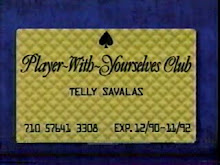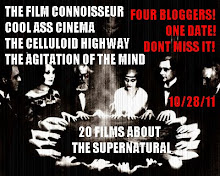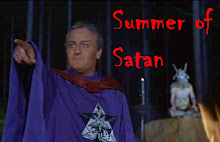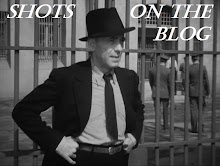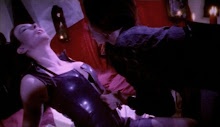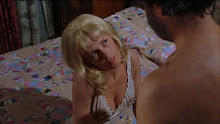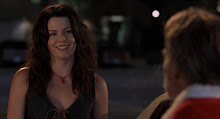Thursday, March 29, 2012
The beautiful game
Wednesday, March 28, 2012
Dirk Bogarde
 Dirk Bogarde - matinee idol, fearless character actor, memoirist, novelist, artist and all-round enigma - would have been 91 today.
Dirk Bogarde - matinee idol, fearless character actor, memoirist, novelist, artist and all-round enigma - would have been 91 today.Sunday, March 25, 2012
BOND-A-THON: Dr No
 Sean Connery: milkman, truck driver, coffin polisher, bodybuilder, actor. Oh yeah, and the definitive James Bond. Although he’d been a jobbing actor for a decade before he was cast as 007, his only lead role had been in the fey musical ‘Darby O’Gill and the Little People’. A son of Edinburgh, his trademark Scots burr would remain in place throughout his career, whether he was playing an Irish-American cop, a Russian submarine commander or an English secret agent.
Sean Connery: milkman, truck driver, coffin polisher, bodybuilder, actor. Oh yeah, and the definitive James Bond. Although he’d been a jobbing actor for a decade before he was cast as 007, his only lead role had been in the fey musical ‘Darby O’Gill and the Little People’. A son of Edinburgh, his trademark Scots burr would remain in place throughout his career, whether he was playing an Irish-American cop, a Russian submarine commander or an English secret agent.It’s putting it mildly to say that producers Harry Saltzman and Albert R. Broccoli took a risk on him. The resolutely rugged and working class Connery was far removed from Ian Fleming’s snobbish and disdainful protagonist (who was it that described Bond “an upper class thug”?), leading director Terence Young to groom Connery into the character, getting him used to the suits, the casinos, the gentlemen’s clubs and the high life. It’s the polarity between actor and character which generates the frisson inherent in Connery’s portrayal of Bond.
‘Dr No’ was the sixth of Fleming’s novels, but was chosen as the first film after an original script developed by Fleming, Kevin McClory and Jack Whittingham – with the horribly prosaic title ‘James Bond, Secret Agent’ – wound up in a legal wrangle when Fleming decided to rework it for his 1961 novel ‘Thunderball’. The producers settled on ‘Dr No’ as having an exotic locale in Jamaica, a streamlined narrative, and one only really expensive set-piece (the explosive finale at Crab Key, the heavily-guarded island Dr No uses as his base).
 At just over $1million, ‘Dr No’ was moderately budgeted even for the early 60s. Purpose of comparison: released the same year, John Frankenheimer’s ‘The Manchurian Candidate’ cost twice as much, John Ford’s ‘The Man Who Shot Liberty Valance’ three times, and David Lean’s ‘Lawrence of Arabia’ burned though $15million, a budget that wouldn’t be equalled by a Bond movie until 1977’s ‘The Spy Who Loved Me’.
At just over $1million, ‘Dr No’ was moderately budgeted even for the early 60s. Purpose of comparison: released the same year, John Frankenheimer’s ‘The Manchurian Candidate’ cost twice as much, John Ford’s ‘The Man Who Shot Liberty Valance’ three times, and David Lean’s ‘Lawrence of Arabia’ burned though $15million, a budget that wouldn’t be equalled by a Bond movie until 1977’s ‘The Spy Who Loved Me’.Richard Maibaum, Johanna Harwood and Berkley Mather worked on the script, with uncredited additions from Young. Mather had generally worked in television and would have no other involvement in the franchise. Harwood returned for co-writer duties on ‘From Russia With Love’. Maibaum became a series regular, contributing to thirteen Bond movie scripts up to ‘Licence to Kill’.
 Opening with a somewhat psychedelic and very dated set of opening credits (it’s the first and last Bond not to feature a pre-credits sequences), the story begins with the assassination of Jamaica-based British agent Commander Strangways (Tim Moxon) and the theft from his office of files on Crab Key and Dr No (just in case, you know, the title hadn’t tipped you off as to the villain’s identity). In London, spymaster M (Bernard Lee) briefs Bond (Connery) on Strangways’ disappearance and his investigation, on the Americans’ behalf, of tracking interference with Cape Canaveral rocket launches that seems to be emanating from his neck of the woods. (I’m assuming that in the early 60s it was reasonably plausible that America might need a bit of help from a handful of upper-class Brits.)
Opening with a somewhat psychedelic and very dated set of opening credits (it’s the first and last Bond not to feature a pre-credits sequences), the story begins with the assassination of Jamaica-based British agent Commander Strangways (Tim Moxon) and the theft from his office of files on Crab Key and Dr No (just in case, you know, the title hadn’t tipped you off as to the villain’s identity). In London, spymaster M (Bernard Lee) briefs Bond (Connery) on Strangways’ disappearance and his investigation, on the Americans’ behalf, of tracking interference with Cape Canaveral rocket launches that seems to be emanating from his neck of the woods. (I’m assuming that in the early 60s it was reasonably plausible that America might need a bit of help from a handful of upper-class Brits.)Bond’s mission is compromised from the off: no sooner has he arrived in Jamaica than there’s an assassination attempt – the first of several. One antagonist kills himself rather than talk, leading Bond to wonder who wields that kind of power. That’ll be the eponymous Dr No (Joseph Wiseman), whom Young teasingly keeps out of sight until the last third. No’s first scene shows us not the man himself but his power over his minions, as he puts the frighteners on Professor Dent (Anthony Dawson) and exhorts him to kill Bond.
 Setting the pattern for most of the Bond villains, Dr No is refined, cultured (an in-joke has Goya’s portrait of the Duke of Wellington, stolen the year before the film went into production, in Dr No’s possession), articulate, megalomaniacal and the proud owner of a fully kitted-out secret base hidden from the eyes of the world. He works for SPECTRE (the Special Executive for Counter-intelligence, Terrorism, Revenge and Extortion), an underground organisation that takes on more significance in later films on account of its CEO, one Ernst Stavro Blofeld.
Setting the pattern for most of the Bond villains, Dr No is refined, cultured (an in-joke has Goya’s portrait of the Duke of Wellington, stolen the year before the film went into production, in Dr No’s possession), articulate, megalomaniacal and the proud owner of a fully kitted-out secret base hidden from the eyes of the world. He works for SPECTRE (the Special Executive for Counter-intelligence, Terrorism, Revenge and Extortion), an underground organisation that takes on more significance in later films on account of its CEO, one Ernst Stavro Blofeld.Setting the pattern for several decades of straight-up sexism, Bond takes an unreconstructed view of women and punctuates his spying with shagging as he dallies with baccarat-playing rich girl Sylvia Trench (Eunice Gayson) before he leaves for his mission, fools around with the treacherous Miss Taro (Zena Marshall) and enjoys an amorous encounter with Honey Ryder (Ursula Andress) as a reward for saving the day.
 Unlike many of its successors, ‘Dr No’ is gadget-free. Q is present, but referred to not by the initial of his department but by name as Major Boothroyd. He’s also played by Peter Burton. Desmond Llewellyn wasn’t cast until ‘From Russia With Love’, when Burton was unavailable to reprise the role. Bond’s opposite number from the CIA, Felix Leiter (Jack Lord) also gets his first outing.
Unlike many of its successors, ‘Dr No’ is gadget-free. Q is present, but referred to not by the initial of his department but by name as Major Boothroyd. He’s also played by Peter Burton. Desmond Llewellyn wasn’t cast until ‘From Russia With Love’, when Burton was unavailable to reprise the role. Bond’s opposite number from the CIA, Felix Leiter (Jack Lord) also gets his first outing.In terms of action, Young crafts a sleek and efficient thriller from his limited budget, with car chases, gunboats, shoot-outs, hand-to-hand combat, and an explosive denouement washing across the screen in glorious Technicolor. His direction, though, is often perfunctory and early scenes are padded with local colour. Viewed fifty years down the line, it’s an entertaining way to pass an hour and three quarters, but back then it was something new and exciting, banging at the doors of mainstream entertainment with enough force to create a global phenomenon. There’s no end credits promise that Bond would be back – ‘From Russia With Love’ kicked off that little tradition – but the box office receipts made it an inevitability.
Saturday, March 24, 2012
Bond ... James Bond
Tuesday, March 20, 2012
NHS: RIP
The last time I posted anything of political import on these pages, there was widespread rioting across the UK.
I cannot understand why there isn’t rioting today, why people in their millions aren’t converging on Whitehall, armed with whatever was to hand, and demanding David Cameron’s resignation – if not his head on a plate. And maybe just cutting out the niceties and hanging Andrew Lansley from the nearest available lamp-post.
On 5 July 1948, England’s National Health Service – the NHS – came into being. Its architect was Labour politician Aneurin Bevan. His vision was healthcare for all, funded by taxes instead of being dependent on health insurance; a classless system – socialist in the purest sense of the word – that would care for Britons, as he put it, “from the cradle to the grave”.
On 20 March 2012, Andrew Lansley’s so-called reforms were passed through the Commons. Privatisation, which has already been escorted in surreptitiously through the back door in Hinchingbrooke, has now received carte blanche. Is it a co-incidence that Lansley’s former PA is currently Head of Communications for a major independent healthcare provider?
Aneurin Bevan did the British public arguably the greatest service that can be claimed by any politician. David Cameron – our unvoted-for Prime Minister – stubbornly backed Lansley in the face of massive public protest, scepticism from professional healthcare bodies, and demands for Lansley’s unpublished “risk register” to be made public.
Once again our government has ignored its people. The NHS now exists purely as a brand. It will be broken up into competing services with patient care subjugated to profit margins. Free market economy hammers another nail into socialism. I hoped I’d never have to say this, but Thatcherism is once again the driving force behind Britain’s socio-political direction. A direction that has dragged Bevan’s great institution into its grave and is dragging the rest of the country in right behind it.
The riots last year, and the political disenfranchisement which created the atmosphere conducive to them, left me feeling that there was nothing to believe in politically in Britain. That goes double tonight.
Sunday, March 18, 2012
RocknRolla

When, last year, I reviewed Guy Ritchie’s earlier crime caper ‘Snatch’, I drew this unlikely comparision: “the closest I can come to describing the plotting and overall aesthetic is like a P.G. Wodehouse novel. Except with guns. And swearing. Your average Wodehouse novel consists of a foppish toff, a meddling aunt, a potential fiancée, a big social event and the always lurking potential for cringing embarrassment at same. The machinations of a handful of characters and a couple of overlapping incidents are shuffled with the blink-and-miss-it legerdemain of a game of find the lady. Sit down and try to unpick the narrative after you’ve set the novel aside and you’ll be engaging in an exercise in pointlessness.”
You can’t quite say the same of ‘RocknRolla’, since the tone isn’t as rambunctious nor the laughs as frequent. And at nearly half an hour longer than ‘Snatch’, the narrative has a little more room to breathe. This is a generally a good thing, as breathlessly overcomplicated plotting can often ruin a movie; however, Ritchie does breathlessly overcomplicated plotting better than anyone and languorous scenes in his movies are as jarring as a shoot-out in a Tarkovsky flick.
‘RocknRolla’ kicks off with a demonstration of how mob boss Lenny Cole (Tom Wilkinson) – London is, apparently, “his town” – runs a real-estate racket; it’s four-and-a-half minutes of dizzying back and forth in which Lenny gets his mitts on a nice bit of property, a city councilor (Jimi Mistry) has his strings pulled till he doesn’t know which tune he’s dancing to let alone who’s calling it, and low-rent crims One Two (Gerard Butler) and Mumbles (Idris Elba) find themselves royally stiffed and owing Lenny two big ones.
One Two and Mumbles are part of a group of small-timers who style themselves, with Peckinpahesque delusions of grandeur, as “the Wild Bunch”. Their number includes Handsome Bob (Tom Hardy), who’s looking at a five stretch and wants a little favour from One Two before he goes down (and for those of you who’ve seen the film, yes that pun was intentional). The Wild Bunch pull occasional heists from information provided by Stella the Accountant (Thandie Newton).

Stella is currently working for Russian oligarch Uri Omovich (Karel Roden). Uri wants to build a stadium in London and is employing Lenny to grease the wheels of bureaucracy. Uri lends Lenny a painting in a gesture of largesse (in the film’s subtlest joke, Ritchie only ever shows the frame, not the painting), but finds his luck changes almost immediately as he’s ripped off, over two transactions, to the tune of £14million. Blaming ill-luck on the absence of the painting, he demands it back from Lenny. One little problem: Lenny’s had the painting stolen from him by his coked-up, wayward and dangerous unpredictable stepson, Johnny Quid (Toby Kebbell), frontman of a punk band called the Quid Lickers. The same Johnny Quid who’s just been reported drowned.
The usual mélange of double- and triple-crosses ensues as Lenny – suspecting, correctly, that Johnny is alive and milking the publicity for renewed album sales – tasks his enforcer Archie (Mark Strong) to find him and retrieve the painting, Uri steps up security in the form of two Chechnyan hardnuts who make the T-1000 look like Quentin Crisp, One Two and Mumbles have a bruising encounter with same, Handsome Bob coerces information regarding the informer who got him the five-stretch out of Stella’s gay marriage-of-convenience lawyer husband Bertie (David Bark-Jones), and Stella herself tries to extricate herself from Uri’s romantic overtures.
Out of these Altman-like criss-crossings come some inspired scenes. In particular: Archie’s masterclass on how to deliver a proper slap; One Two and Mumbles struggling to find reverse gear in a getaway car; a deliberately naff dance routine; and a heist sequence that starts out in ultra-proficient ‘Heat’-style and swiftly degenerates into a fracas in a sporting goods store. But it’s never quite as dementedly entertaining as ‘Snatch’. Nor is it ever fully clear who our protagonist is: Butler is first-billed, but One Two fades into the background several times in the second half, during which time Archie begins to play an increasingly important part in things. However both are given short shrift for the ascendancy of a pivotal – but, in terms of screen-time, almost peripheral – character.
The cast deliver in spades, right down to one- or two-scene supporting turns from Gemma Arterton as the dolled-up secretary at Johnny’s record label, Chris Bridges (a.k.a. Ludacris) as Johnny’s long-suffering manager, and Nonso Anozie as ticket tout and costume-drama fan Tank (Archie’s speculation as to the derivation of his name gives ‘RocknRolla’ its most memorable moment of political incorrectness). David Higgs’s slightly washed-out cinematography strikes a good balance between the flashy lifestyles of Uri and Lenny, and the grubby milieu of One Two and his ilk, between the well-lit artifice of the art gallery Stella patronises and the shadowy interior of the abandoned warehouse where Lenny conducts interrogations.


Best of all though, is Ritchie’s unrestrained love of film-making; every frame is shot through with a sort of wideboy joie de vivre. The end credits promise, in cheeky James Bond style, that the main players will return in ‘The Real RocknRolla’. Hope so.
Thursday, March 15, 2012
Splice

In a moment of surreal clarity, it occurred to me as the end credits rolled that ‘Splice’ is basically ‘Rise of the Planet of the Apes’ but with psycho-sexual overtones, monstrous angels and off-the-scale exponential evolutionary development. Both films take playing-God scientists as their protagonists; said protagonists take their work home with them in an absolutely literal sense; their work develops very quickly into something they can no longer control.
Both films feature bio-genetic research presentations that go spectacularly tits up, and both make villains of a stuffed-shirt project management type who, when all’s said and done, is only doing his job. Both share a pivotal moment where a non-human character’s rebellion is heralded by their startling and brutally succinct use of speech. But whereas ‘RotPotA’ sides unequivocally with its genetically engineered simian, Vincenzo Natali’s thorny psychodrama walks a twisty and shadowy path of moral compromise and emotional ambiguity.
After an inventive (if protracted) sequence wherein the camera glides through some kind of protean interior, picking out the opening credits as if they were an organic part of this as-yet-unrevealed being, a scene of birth – from the embryo’s POV – sets the tone. Birth, parenthood, relationship power plays and sexual neuroses simmer away in virtually every scene for the next 100 minutes.

Under the sponsorship of a pharmaceutical corporation, Clive (Adrien Brody) and Elsa (Sarah Polley) – the co-owners of the Nucleic Exchange Research & Development facility, and also partners in the romantic sense – are developing artificial life-forms designed to yield medicinal proteins. They have enjoyed unparalleled success in splicing DNA from various animals, and their paymasters are delighted. (The firm’s name, or at least its acronym, is the film’s clunkiest joke. Calling its protagonists Clive and Elsa is its cleverest.)
Elsa is keen to further their research beyond the corporation’s remit and attempt to introduce human DNA into the splice. Clive is initially hesitant, but curiosity gets the better of him. He and Elsa use various samples, but the experiment repeatedly fails. Then Elsa introduces a new sample – unbeknownst to Clive, at this point anyway – it’s her own DNA, and the desired results are achieved. The downside is that Clive and Elsa now have a highly energetic mutant creature on their hands which is maturing through a ludicrously accelerated lifestyle. They call the creature Dren. (Check out that acronym again if you’re wondering why.)
With Dren increasingly difficult to keep under wraps at the lab, they relocate her to a remote farmhouse and all but give up on the day job. Yes, Dren is a she. It’s difficult to tell at first, with Dren resembling an outtake from ‘Alien’. Pretty soon, the resemblance is more akin to a little girl with the facial grooves of a cenobite and the ambulatory capacity of a velociraptor. And not long after that, she’s all grown up, still somewhat reptilian but disturbingly seductive.

Played in her younger iteration by Abigail Chu and as an adult by Delphine Chaneac, Dren is a mesmerising and unpredictable character, achingly vulnerable in the early stages of her development, darkly sexual later, and – finally – dangerous when the repercussions of playing God catch up with Clive and Elsa. Natali veers awfully close to overplaying his hand here, doling out the transgressors’ punishment with a zealous sense of Old Testament nastiness. He’s not exactly subtle elsewhere, with a couple of lab-based montages coming across more like MTV videos than scenes of scientific discovery, and much of the dialogue clunkily expository rather than naturalistic.
But Natali gets a lot more right than he gets wrong. ‘Splice’ neatly marries (or should I say grafts) its Frankenstein/artificial life concept with an almost mythological approach to its unworldly protagonist, so that Dren is variously angel, demon, siren and creature from the id. In doing so, Natali keeps throwing out ideas right up to the finale; I’ll leave it to other reviewers to say whether he over eggs the
Monday, March 12, 2012
Before you could say "Jack Kerouac" / you'd turn your back and I'd be gone ...
Here’s the trailer for ‘On the Road’:
Not sure how I feel about it, nor about Walter Salles being at the helm (I was distinctly underwhelmed by ‘The Motorcycle Diaries’) but Jesus H Christ, that’s some cast!
The Men Who Stare at Goats

I’d had it on good authority that ‘The Men Who Stare at Goats’ was a POS. Despite this, I neglected to delete it from my rental list. So when it turned up last week, my rationale was something like this: aww, hell, it stars George Clooney, Ewan McGregor, Jeff Bridges and Kevin Spacey, and at a pinch I can feature it as part of my intermittent series of espionage-related cinema, surely it’s worth a watch.
Readers, I watched it.
POS is perhaps a tad harsh – there are a couple of bona fide laugh out loud moments – but to watch Grant Heslov’s film is ultimately to watch a terrific cast squander themselves as a brilliant concept is simply frittered away.
For this reason, we won’t dwell on it too long. Synopsis time: journo Bob Wilton (McGregor) does a human interest piece on bonkers ex-soldier Gus Lacey (Stephen Root) who reminisces about his time with Lyn Cassady (Clooney) in a psychic military unit led by quasi-hippie Bill Django (Bridges). Initially sceptical, Wilton files the story then heads to Iraq to prove himself as a front-line reporter after the breakdown of his marriage. It’s here he bumps into Cassady, who recounts the story of Django’s unit as the pair head across country so Cassady can complete some mysterious mission.

Herein my first problem with the film. Point of view and lead character duties skip from Wilton to Cassady to Django with such skittish abandon that I couldn’t get a handle on whether Heslov and scripter Peter Straughan were being arbitrary, indecisive, or full-on going for an anti-narrative. The tone, too, veers from genuinely amusing to trying-too-hard to actually-quite-mean-spirited, seemingly on a whim.
Round at the halfway mark, the film coheres into the Wilton and Cassady road show, but it’s delivered all its satirical barbs by this point and only one inspired but narratively redundant scene involving Robert Patrick as the head of a US security who gets into a firefight with a different US security force which he happily blames on the Iraqis emerges as memorable. The firefight, incidentally, is over superiority in a queue at a petrol station.
Based on a non-fiction work by Jon Ronson, and opening with the irresistible credit “more of this is true than you would believe”, ‘The Men Who Stare at Goats’ starts out knee-deep in potential but never fully gets to grips with the off-the-wall political satire the concept demands. Instead we get a smorgasbord of contrived and often unfunny in-jokes, mostly referencing the casts’ previous work. McGregor seems to have been cast purely as the butt of the joke every time one of the psychic irregulars refers to himself as a Jedi warrior.
Heslov, making his feature debut, doesn’t stamp a strong enough visual or satirical signature on the material, particularly when the finale cries out for the demented visual flair of a David Lynch or an Alejandro Jodorowsky. What Heslov manages is ninety minutes of moderate amusement, when Ronson’s book could easily have lit the fuse on a two-hour delirious headfuck.
Sunday, March 11, 2012
Normal service will be resumed
That project I was working on? The one that was preventing me from updating Agitation as much as I’d like?
Finished!
Or at least, a first draft is now complete.
Which means that we can get back to some film reviews around these here parts. Join me tomorrow as we get this show back on the road.
Wednesday, March 07, 2012
Rachel Weisz
Sunday, March 04, 2012
Literary birthdays

It’s James Ellroy’s 64th birthday today. Here’s the demon dog of crime fiction on being knows at “the guy who wrote ‘L.A. Confidential’.” This quote also contains advice on the etiquette of talking to little old ladies.
‘L.A. Confidential’, the movie, is the best thing that happened to me in my career that I had absolutely nothing to do with. It was a fluke—and a wonderful one—and it is never going to happen again, a movie of that quality. Here’s my final comment on ‘L.A. Confidential’, the movie: I go to a video store in Prairie Village, Kansas. The youngsters who work there know me as the guy who wrote ‘L.A. Confidential’. They tell all the little old ladies who come in there to get their G-rated family flick. They come up to me, they say, “Oooooh, you wrote ’L.A. Confidential’. Oh, what a wonderful, wonderful movie. I saw it four times. You don’t see storytelling like that on the screen anymore.” I smile, I say, “Yes, it’s a wonderful movie, and a salutary adaptation of my wonderful novel. But listen, granny – you love the movie, did you go out and buy the book?” And granny invariably says, “Well, no, I didn’t.” And I say to granny, “Then what the fuck good are you to me?”

Alan Sillitoe would have turned 84 today. As regular readers of this blog know, I’m involved with the Alan Sillitoe Committee, a group dedicated to promoting Alan’s work through a variety of media, and to raising funds for a permanent memorial to Alan to be sited in his hometown of Nottingham. Please visit our website for information on forthcoming events and a variety of articles, archive photos and more. The website is an ongoing project which we intend to build into a major online resource. Please like our Facebook page, as well. If you can spare a little for a donation, it would be greatly appreciated and we’ll happily feature your name on our wall of honour.
Here’s Alan’s most famous creation – the belligerent Arthur Seaton in ‘Saturday Night and Sunday Morning’ – slogging through his National Service and resolutely refusing to let the bastards grind him down:
On his first parade the sergeant-major exclaimed that he couldn't make out the shape of Arthur's head because there was so much hair on it, and Arthur jocularly agreed to get it cut, intending to forget about it until the fifteen days was over, which he did. 'You're a soldier now, not a Teddy-boy,' the sergeant-major said, but Arthur knew he was wrong in either case. He was nothing at all when people tried to tell him what he was. Not even his own name was enough, though it might be on on his pay-book. What am I? he wondered. A six-foot pit-prop that wants a pint of ale. That's what I am. And if any knowing bastard says that's what I am, I'm a dynamite-dealer, Sten-gun seller, hundred-ton tank trader, a capstan-lathe operator waiting to blow the army to Kingdom Cum. I'm me and nobody else; and what people think I am or say I am, that's what I'm not, because they don't know a bloody thing about me.
